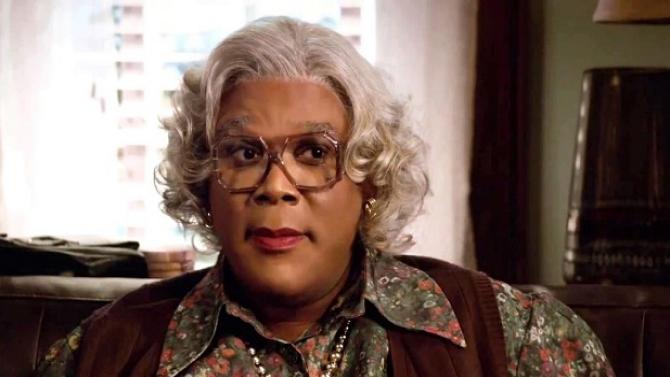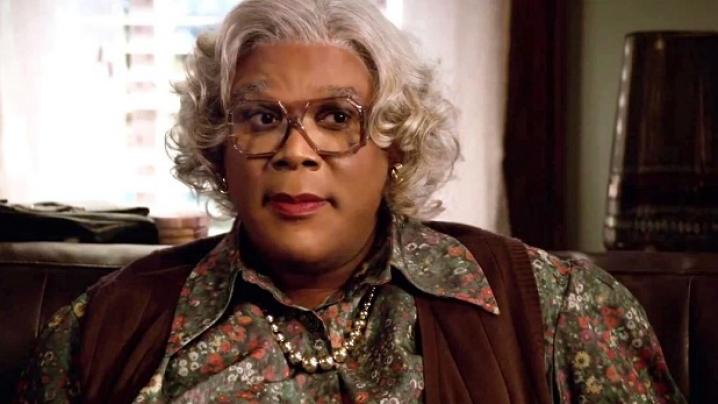[ad_1]

Tyler Perry as his Madea character
IMDB
I feel about Tyler Perry the way Spike Lee did before they both called a truce on bashing each other in the media, which is to say, with rare exception, I’m no fan of Perry’s work.
I respect that many good people are Perry fans. Case in point: Perry has four shows on OWN, including the uber-popular soap opera The Haves and the Have Nots, which returned for a new season Tuesday night. Perry is also currently starring in Madea on the Run, his 20th touring stage play in 23 years. No doubt because of Perry’s huge popularity and the timing of his latest venture, New York magazine sat down with the entertainment mogul to pick his brain about his latest projects and the never-ending controversy that seems to surround Perry’s every move.
At this point in his career, Perry is an expected pro at interviews, and nowhere is this more apparent in his New York magazine interview than when, despite all the critiques about his work, Perry sidesteps addressing all the meaningful perspectives and boils down the dislike of his work to folks being mad that he has overweight characters in his productions.
“When people were like, ‘How dare you put fat black people on television, these are caricatures, these are stereotypes’—I was so offended because my aunt’s fat. My mother’s fat. My cousins are fat,” Perry said. “People who are like, ‘How dare you’ … I would hear all these things, and I would go, ‘Hmmm.’”
Does Perry live in the same insulated bubble as R. Kelly, the one that keeps him so isolated from reality that he genuinely has no clue why his critics don’t like his work? There might be like five people who care about the weight of Perry’s characters. And I will go on the record as siding with Perry that those body-shaming people are ignorant.
I’ll also add that, unlike many critics of Perry’s work, I’m not even a little offended by the buffoonery in his comedic offerings. I don’t think the art created by black people must be beholden to the respectability-politics edict that says we must look like we have sense in front of white people. We are equally entitled to make—and should be able to enjoy—stupid movies, play stupid roles, have hyperdramatic characters crack stupid lines and laugh at that without guilt. I don’t take issue with stupid.
Honestly? I don’t even care about the man-in-a-dress issue that everyone seems to harp on ever since Dave Chappelle brought it up. I don’t think Madea’s funny, but that’s because I don’t share Perry’s sense of humor, not because the role is played by Perry in a dress. Martin Lawrence in a dress as Big Mama or even Sheneneh cracks me up; so does Robin Williams as Mrs. Doubtfire. I don’t see comedians in dresses, particularly black comedians in dresses, as some sort of grand Hotep conspiracy to emasculate and feminize black men.
The issues I do have with Perry are among the same ones that most critics of his work have: The stories are often disjointed and predictable, the moralizing is prolific, the messages are stereotypical and damaging, and the portrayal of almost every black person with an education or a good job, or any black woman without a husband, is god-awful.
What do I specifically mean? Was there anyone who didn’t know within the first five minutes of Why Did I Get Married?—one of Perry’s better movies—that the guy playing Jill Scott’s husband was cheating on her with her best friend? Was anyone surprised when he left her?
Perry’s films never display nuance or subtlety or even any real buildup. Everything’s extra-extra, like Janet Jackson’s character in Why Did I Get Married Too?; she lives in a glass house and then breaks all the glass in a drawn-out, sweaty, psychotic break. All that extra might be necessary when you’re on a stage, playing to the cheap seats in the back of the house. But on a gigantic film screen or even a living room flat screen, it’s just too dang much.
Speaking of Jackson, was her character’s storyline really necessary in For Colored Girls …? The story was perfect as is. But to add a down-low storyline and reignite hysteria about the minuscule percentage of men who are living that life and to present it as a bigger threat to black women than black men cheating with other women is wrong on so many levels. To focus on down-low men as the source of HIV/AIDS in black women for the shock value is not only inaccurate, it’s irresponsible. Perry is always talking about doing slapstick to loosen up the audience and send them a message. OK, so send one that’s actually helpful instead of adding a cheap plot twist that demonizes gay men.
These are just a few of the many valid complaints about Perry’s work. At their core, the criticisms are about his lack of skill as a storyteller, not the size of his characters. I completely understand why Perry doesn’t feel compelled to improve or outsource. He has excelled financially and socially while peddling stereotypes and producing mediocre work. He has cultivated a core audience of people who do not demand that he raise the bar. And that’s fine. He has a lane. He drives in it. But let him not be either so delusional or so deceptive as to pretend that his critics are haters without a cause, when really they’re just people who want better quality.
Demetria Lucas D’Oyley is a contributing editor at The Root, a life coach and the author of Don’t Waste Your Pretty: The Go-to Guide for Making Smarter Decisions in Life & Love as well as A Belle in Brooklyn: The Go-to Girl for Advice on Living Your Best Single Life. Follow her on Twitter.
Like The Root on Facebook. Follow us on Twitter.
[ad_2]





















